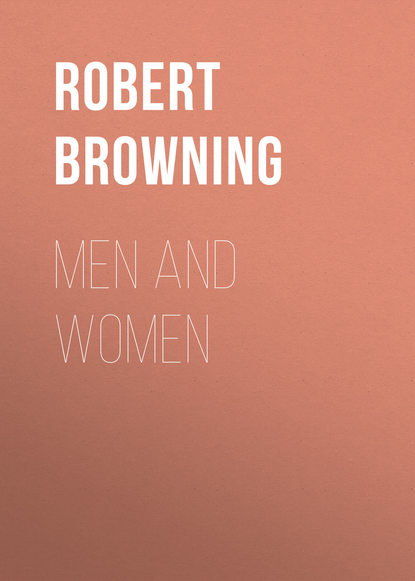По всем вопросам обращайтесь на: info@litportal.ru
(©) 2003-2024.
✖
Men and Women
Настройки чтения
Размер шрифта
Высота строк
Поля
So come, the harp back to your heart again!
You are a poem, though your poem's naught.
The best of all you showed before, believe,
Was your own boy-face o'er the finer chords
Bent, following the cherub at the top
That points to God with his paired half-moon wings.
NOTES
"Transcendentalism" is a criticism, placed in the mouth of a poet, of another poet, whose manner of singing is prosaic, because it seeks to transcend (or penetrate beyond) phenomena, by divesting poetic expression of those concrete embodiments which enable it to appeal to the senses and imagination. Instead of bare abstractions being suited to the developed mind, it is the primitive mind, which, like Boehme's, has the merely metaphysical turn, and expects to discover the unincarnate absolute essence of things. The maturer mind craves the vitalizing method of the artist who, like the magician of Halberstadt, recreates things bodily in all their beautiful vivid wholeness. Yet the poet who sincerely holds so fragmentary a conception of art is himself a poem to the poet who holds the larger view. His boy-face singing to God above his ineffective harp-strings is a concrete image of this sort of poetic transcendentalism.
[It is obvious that Browning uses the Halberstadt and not the Boehme method in presenting this embodiment of his subject. The supposition of certain commentators that Browning is here picturing his own artistic method as transcendental is a misconception of his characteristic theory of poetic art, as shown here and elsewhere.]
HOW IT STRIKES A CONTEMPORARY
1855
I only knew one poet in my life:
And this, or something like it, was his way.
You saw go up and down Valladolid,[3 - Valladolid: the royal city of the kings of Castile, before Philip II moved the Court to Madrid, where Cervantes, Calderon, and Las Casas lived and Columbus died.]
A man of mark, to know next time you saw.
His very serviceable suit of black
Was courtly once and conscientious still,
And many might have worn it, though none did:
The cloak, that somewhat shone and showed the threads,
Had purpose, and the ruff, significance.
He walked and tapped the pavement with his cane,
Scenting the
world, looking it full in face,
An old dog, bald and blindish, at his heels.
They turned up, now, the alley by the church,
That leads nowhither; now, they breathed themselves
On the main promenade just at the wrong time:
You'd come upon his scrutinizing hat
Making a peaked shade blacker than itself
Against the single window spared some house
Intact yet with its mouldered Moorish work—
Or else surprise the ferret of his stick
Trying the
mortar's temper 'tween the chinks
Of some new shop a-building, French and fine.
He stood and watched the cobbler at his trade,
The man who slices lemons into drink,
The coffee-roaster's brazier, and the boys
That volunteer to help him turn its winch.
He glanced o'er books on stalls with half an eye,
And fly-leaf ballads on the vendor's string,
And broad-edge bold-print posters by the wall.
He took such cognizance of men and things,
If any beat a horse, you felt he saw;
If any cursed a woman, he took note;
Yet stared at nobody—you stared at him,
And found, less to your pleasure than surprise,
He seemed to know you and expect as much.
So, next time that a neighbor's tongue was loosed,
It marked the shameful and notorious fact,
We had among us, not so much a spy,
As a recording chief-inquisitor,
The town's true master if the town but knew
We merely kept a governor for form,
While this man walked about and took account
Of all thought, said and acted, then went home,
And wrote it fully to our Lord the King
Who has an itch to know things, he knows why,
And reads them in his bedroom of a night.
Oh, you might smile! there wanted not a touch,
A tang of . . . well, it was not wholly ease
As back into your mind the man's look came.
Stricken in years a little—such a brow
His eyes had to live under!—clear as flint
On either side the formidable nose
Curved, cut and colored like an eagle's claw,
Had he to do with A.'s surprising fate?
When altogether old B. disappeared
And young C. got his mistress, was't our friend,
His letter to the King, that did it all?
What paid the Woodless man for so much pains?
Our Lord the King has favorites manifold,
And shifts his ministry some once a month;
Our city gets new governors at whiles—
But never word or sign, that I could hear,
Notified to this man about the streets
The King's approval of those letters conned
The last thing duly at the dead of night.
Did the man love his office? Frowned our Lord,
Exhorting when none heard—"Beseech me not!
Too far above my people—beneath me!
I set the watch—how should the people know?
Forget them, keep me all the more in mind!"
Was some such understanding 'twixt the two?
I found no truth in one report at least—
That if you tracked him to his home, down lanes
Beyond the Jewry, and as clean to pace,
You found he ate his supper in a room
Blazing with lights, four Titians[4 - Titian: pictures by the Venetian, Tiziano Vecellio (1477-1576), glowing in color, presumably of large golden-haired women like his famous Venus.] on the wall,
And twenty naked girls to change his plate!
Poor man, he lived another kind of life








